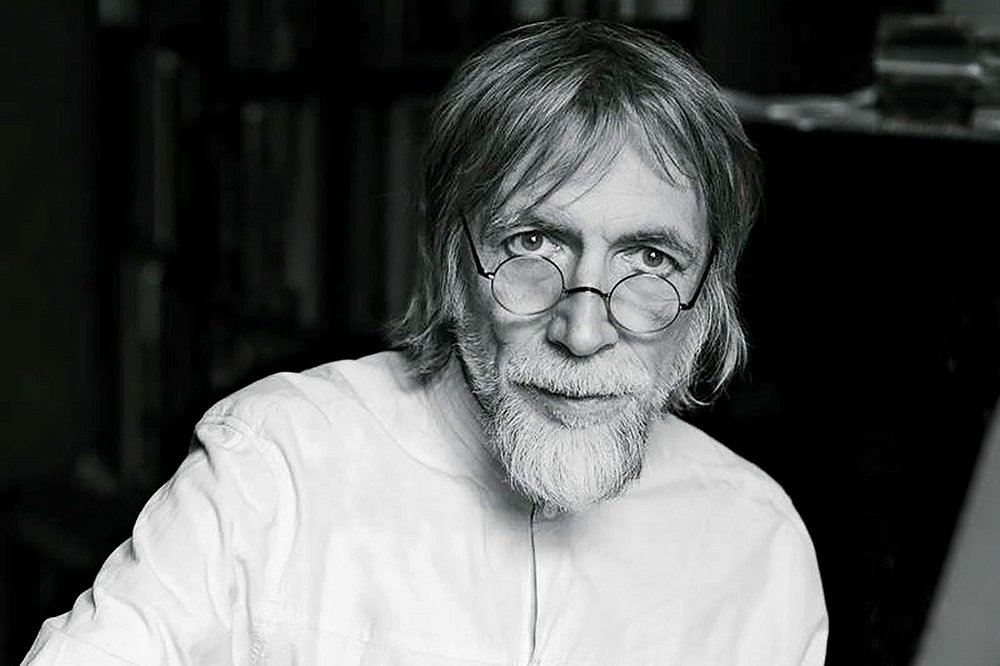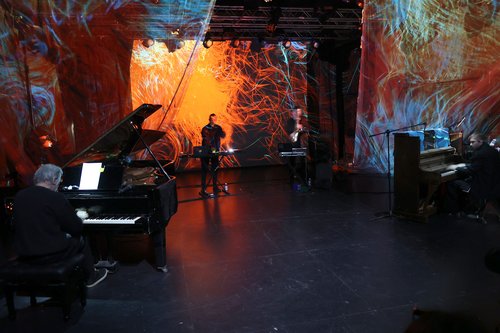Martynov’s Transition From Musical Notes to Philosophy

Portrait of Vladimir Martynov. Courtesy of a-s-t-r-a gallery
Septuagenarian composer and Renaissance man Vladimir Martynov is a force to be reckoned with. As he nears his ninth decade, he has just written a new piece of music for an experimental ballet, staged an exhibition of paintings in Moscow and created an artist’s book to add to the impressive pile of publications where his deep love and knowledge of music gives way to a unique philosophical questioning which could help us all find peace.
The simple music of the organ with its medieval connotation transitions into the rhythmic sounds of the percussion with a startling alternation of timbres and this forms the basis of the drama at the heart of the score of the experimental ballet ‘The White Room’. As Martynov’s musical score reaches its climax the murmur of a xylophone gives way to a bold drum, which has a sudden deafening effect on the listener, but the composer quickly shifts this explosion into bell-like timbres, leading the listener instead into a state of peace. Meditation is also central to choreographer Pavel Glukhov’s (b. 1986) approach: in the finale, having undergone a journey of self-discovery in the eponymous white room the dancers swap their black tights for airy, multi-coloured costumes, reject collective gestures for individual ones and twirl around the stage holding poses which evoke classical Indian gods.
Composer and philosopher Vladimir Martynov (b. 1946) wrote the music for The White Room for the premiere of the XIIth season of the Festival ‘Context. Diana Vishneva’ at the Zaryadye concert hall in Moscow. At 78-year-old Martynov shows no signs of slowing down. Earlier on the day of the premiere of The White Room, he opened his exhibition ‘Ontograms of Autoarchaeology in the Space of Autoarchaeology by Dmitry Poshvin’ at Moscow’s a-s-t-r-a gallery. A few days later he held a solo concert in which he performed his own work on the piano ‘Machine of Memories’ , followed by a presentation of his new art book, ‘The ABC of the Anthropocene’ which reflects the philosophical speculations that occupy Martynov today.
A true Renaissance man, Martynov is composer, artist, thinker, philosopher and writer who does not like to be defined only as a composer. In his 2002 book ‘The End of the Time of Composers’, writing about the origins and development of Western European music, Martynov shows how through many centuries the figure of the composer became a hegemonic figure, and how it has lost its hegemony during the 20th century. This evolution culminated in the music of the American minimalists, as they began to master non-composer music systems in creative ways. The notion of the composer – as a creator seeking and discovering the new – has been nullified in our time; it is now the era of the ‘post-composer’, and this is to be the subject of Martynov's next study, ‘Opus posth zone.’ ‘Opus posth.’ is the name of a contemporary music ensemble led by Martynov’s wife, Tatiana Grindenko (b. 1946), an outstanding violinist who has dedicated part of her own artistic career to performing and popularising his music.
Vladimir Martynov's career began in an academic environment graduating as a composer and pianist from the Moscow Conservatory. His spirit of experimentation led him to the Moscow Experimental Studio of Electronic Music, and gave him a passion for art-rock, even leading to the creation of his own rock band. His search to expand his compositional practices continued with the study of Eastern religions and cultures, the Christian philosophies of West and East, the history of musical science, and the deep study of folk music as well as the rituals of liturgical singing in the Orthodox Church. He also joined the wave of new interest in early music and its idiosyncratic performance practices.
As a composer Martynov began to develop along the lines of the great American minimalists. In parallel to his academic opuses, he wrote music for the theatre and film industry, and major Russian and international directors collaborated with him such as Yuri Lyubimov (1917-2014) and Anatoly Vasilyev (b. 1943). He is perhaps best known to Western audiences as the composer of the music for Paolo Sorrentino's film ‘The Great Beauty’. Notably, in 2009, the world premiere of his opera Vita Nuova in London created controversy and he found himself on the verge of being rejected by some audiences and critics.
In his more recent books, Martynov has continued to present his reflections yet on a different level, going beyond art itself and raising questions about human civilization in general. In his musical philosophy he insists that everything in Western music has been written down already, and now it is only possible to revisit the experience of the distant past. He says the same thing when speaking about humanity.
About his book ‘The ABC of the Anthropocene’, Martynov says: "The term Anthropocene was introduced quite recently. This is an epoch when the environment is perceptibly transformed. When human beings gained the gift of fire and the landscape began to be transformed. When the earliest human civilisations began to appear in China or Egypt the transformation of our environment began. However, in science the formation of the Anthropocene is taken to be the moment when the steam engine was built, when we began to use coal, then oil, and consume fossils. And we began to see the consequences of our consumption of fossils. Now we see this in Antarctica, which is polluted by carbon residues. Then there were radioactive deposits and so on. It turns out that the environment which was first transformed by humans began to transform humans themselves. And so humans turn from the subject of transformation into the object of transformation. Humans turn into biological agents. And this is a feedback effect. Humans have lost the role of what a human being is in our historical understanding. Humans need to move to a new system of self-consciousness, a new system of language. Heidegger said that language is the house of being. The age of the Anthropocene is forcing us to change our language, and these ten sheets are an attempt to develop a new consciousness and a new language."
On ten sheets in the ABC of the Anthropocene, there are only vague hints at the alphabets with which most of us are familiar. They are mainly images that look more like petroglyphs. "Our potential is related to the alphabet, but the alphabet has a kind of permissive power. This is not my idea; McLuhan [ed. Canadian philosopher Marshall McLuhan (1911-1980)] wrote about that" says Martynov. "What is the point of the alphabet? It destroys the living connections between human beings and the reality around them … and the Anthropocene epoch necessitates a transition to petroglyphs."
Reflections on the alphabet also imply a discussion of language and its function in a changing world. According to Martynov, humanity must overcome the symbolic function of language: "Human language is a symbolic function that removes us from reality. Language allows us to describe reality and operate in it but makes us lose the profound. Instead of staying within reality we begin to conceptualise it, describe it and detach ourselves from it. The meaning of all this is to overcome the symbolic function of language".
From the specific, Martynov as a philosopher turns to the big problems of civilisation, noting that humanity is in crisis, which he believes can be solved only through the transition on a new level to a symbiotic system of relations that existed before such as in the Palaeolithic era. "When human beings became civilised, their achievements were well perceived such as the accumulation of knowledge in general, or Beethoven's Ninth Symphony, or the Critique of Pure Reason. But recently with the pandemic, the events in Ukraine, or what is happening in Gaza or Lebanon we can see that civilisation has become the ultimate evil. Epimetheus brought Pandora's Box and it turns out that civilisation is a gradual detachment from its former state of symbiosis. Now you cannot undo the mincemeat, so you cannot go back to the Palaeolithic times. But we can ‘return’ to that time in a new round of human civilisation. To get there, we have to overcome the civilised human beings within us, to overcome what surrounds us. This is the task that humankind is facing today. We are now in a dead-end branch of evolution and must transcend it and enter a new stage of humanity. Our task is not to go backwards, but to try to enter the new era on a new level."
Martynov's latest book, ‘Epimetheus’ Apology’ addresses these ideas of how to achieve harmony and balance like in the Palaeolithic times. Asked what role music plays in this period of crisis for civilisation, Martynov replies: "It helps to make the transition."


















